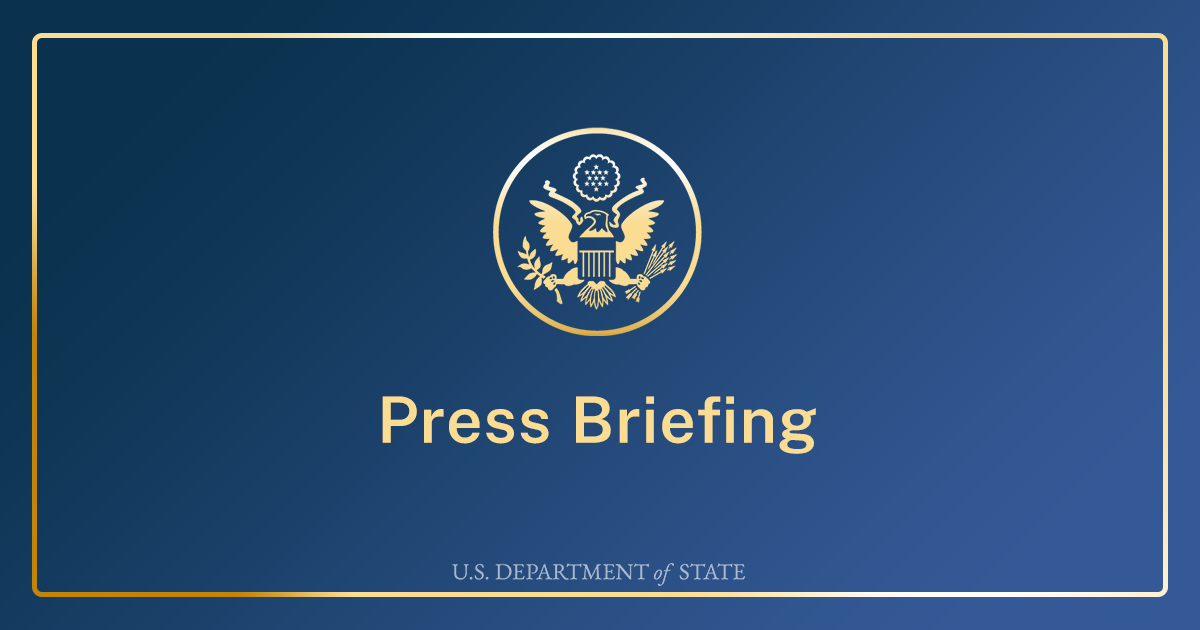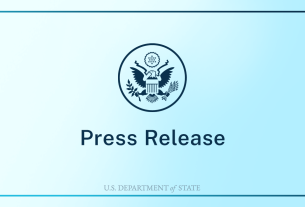AMBASSADOR GILCHRIST: Good afternoon to you all, and I express my thanks to Secretary Blinken and to Spokesperson Matt Miller for their great remarks and for the introduction. My name is Robert Gilchrist, Ambassador Robert Gilchrist, and I am the Senior Bureau Official in the Bureau of Democracy, Human Rights, and Labor. I am honored to be here with you all today to release the 48th Annual Country Report on Human Rights Practices, which was submitted to Congress earlier today.
This congressionally mandated report, colloquially known as the Human Rights Report, has been a flagship effort of the DRL Bureau since 1977. It is completed only through the significant expertise and effort brought by the State Department’s dedicated public servants in U.S. missions abroad and in Washington, for which I and the Department of State are grateful. Human rights belong to everyone, and this report is one way we demonstrate our commitment to these universal rights.
Even though our human rights are universal, they are far from universally respected, and the United States recognizes that standing up for these rights is often dangerous. Human rights defenders and civil society leaders around the world often work at great personal risk to improve the lives of all. That is especially the case for those whose work includes protecting women and girls; members of racial, ethnic, and religious minority groups; LGBTQI+; and persons with disabilities. Members of these groups – and those who press for the protection of human rights – are often targeted with threats and harassment, arrest, and violence. The brave individuals across the globe who risk their own life and freedom to champion the human rights and dignity of others deserve our deep thanks.
In the nearly 50 years since the United States first rolled out the Human Rights Report, we have seen significant changes in respect for human rights around the world. There have been tragedies, but also triumphs. There have been times when U.S. leadership on human rights has been heralded, and times when it has been questioned. But as we look to the future, just a few months after the 75th anniversary of the UN Universal Declaration of Human Rights, one thing is clear: U.S. global leadership in defense and support of human rights is as necessary as ever. This is not a responsibility we take lightly or for granted; we know leadership is earned. The report – unparalleled by any government in its comprehensive approach to human rights worldwide – is one of the tools towards that end.
The Human Rights Report does not seek to catalog every human rights abuse or violation throughout the year, nor does it reach legal conclusions. What it does, uniquely, is present for each country a credible, carefully vetted report that provides the world with a clear window into the human rights conditions in every corner of the globe.
This objective reporting is more essential than ever in a world where we increasingly see facts smeared as lies, lies presented as facts, and information manipulated to disturbing ends by autocrats and other malign actors. By shining a light on the human rights conditions of our adversaries and our partners equally, and by lifting up the selfless efforts of human rights defenders and civil society groups working to improve respect for those rights, the United States is helping contribute to a world where those rights are better protected for everyone.
Although the report documents human rights conditions in countries around the world, the Biden-Harris Administration has made clear that human rights must be safeguarded at home as well. The administration has emphasized since taking office in 2021 that U.S. credibility and standing on human rights internationally depend on how well we are living up to our own obligations and commitments to advance human rights domestically. So we speak of the need to protect and respect human rights for everyone – and when we say that, we mean everyone.
At the conclusion of this briefing, the State Department’s website will have the 2023 Human Rights Report available for the public. I very much appreciate your attendance today, and I am happy also to take a few questions.
QUESTION: Thank you. Hello, Guita Aryan from Voice of America. I have a question on Iran. The Islamic Republic of Iran has cracked down on women’s compulsory hijab since late March and on, and as of the day it attacked Israel, it has even intensified that crackdown. At the same time, there is legislation on Capitol Hill mandating that the administration sanction higher leadership officials – the supreme leader, the president.
Now with this report, which this report is about last year 2023, and this year there is – I’m sure there’s a lot more you may have. Isn’t it not time to sanction the higher officials, and would you be able – should the legislation pass and become an act, it requires its – the first report within 90 days. Would you be able to fulfill that?
AMBASSADOR GILCHRIST: I guess there are a few things to respond – in my response. First of all, with regard to any legislation, of course, the department remains committed to fully implementing every law that is passed by Congress. And so there is certainly a commitment by the department to fulfilling the law.
As you pointed out, this report refers to 2023. However, in 2023, Iran’s dismal human rights record continued to deteriorate. The regime increasingly targeted members of religious and ethnic minority groups, human rights lawyers, journalists, and civil society activists. And as you pointed out, the situation with regard to women continued to deteriorate as well. Iranian women faced increased discrimination through expanded application of punishments against people who violated the mandatory dress code, as you pointed out, leading to protests and widespread acts of civil disobedience.
And many women and human rights activists received additional prison sentences for their activism, and they remain behind bars. The authorities continue to detain, sentence, and execute people in an effort to suppress the peaceful protests that began after the Mahsa Jina Amini’s September 22 death while in custody of the morality police. So the United States also continues to work in multinational arena.
With regard to sanctions, we have applied sanctions. With regard to any future sanctions, I can’t provide and I’m not going to speculate about what may happen in the future. But the department has already actively used visa restrictions and economic sanctions to promote accountability for Iranian authorities’ human rights violations since the most recent crackdown following the 2022 riots.
QUESTION: Thank you. Thank you, Matt. Thank you, sir. The last three reports have shown steadily declining human rights conditions for the Palestinians in Gaza, the West Bank, and East Jerusalem. I want to – and on all aspects. I want to ask you about one aspect, which is administrative detention. The Israelis have put in practice since 1967 something called administrative detention, where they arrest people without charges. They keep them in prison for months, years, sometimes decades, without ever charging them, including children. I want to ask you: Is that a violation of international human rights, in your view?
AMBASSADOR GILCHRIST: Well, I’ll refer you to the Human Rights Report in terms of what we say on that specific issue. With regard to Israel, again, we have been clear with Israel on the moral obligations and strategic imperative it has to protect civilians and the human rights of civilians. And in addition, we’ve been firm in stating that Israel must abide by international humanitarian law, investigate allegations of wrongdoing, including wrongful detentions, and ensure accountability. And that remains the U.S. commitment.
QUESTION: So is it, in the view of the United States, that the administrative detention practiced by Israel – as practiced by Israel – are a violation of the international human rights?
AMBASSADOR GILCHRIST: I said with regard to the Human Rights Reports, the Human Rights Reports do not trigger any sanctions, do not provide any analysis, but rather provide an assessment of the facts on the ground as they are reported to our embassy.
QUESTION: Hi, Missy Ryan from The Washington Post. I wanted to ask you a little bit more about the assessment regarding Israel’s response to alleged human rights abuses by members of the government or the security forces. In the 2022 report, it says that the Israeli military and civilian justice systems have rarely found members of the security forces to have committed abuses, and then it says that some steps were taken. In the ‘23 report, it just says that some credible steps were taken to identify and punish. Is the U.S. assessment no longer that Israel rarely takes action against the security forces? Could you somehow provide —
AMBASSADOR GILCHRIST: I think regarding that specific language —
AMBASSADOR GILCHRIST: — I don’t have details with regard to that. But we can certainly get back to you with that.
QUESTION: Could you give us some sort of assessment of the – to what extent – some steps were taken. To what extent were those steps taken? Was it occasionally? Do you feel like – how far did it go to what you feel like would be an adequate standard? If you could provide any context there.
AMBASSADOR GILCHRIST: I think in the framework of the reports we don’t provide sort of a qualitative assessment of a particular situation or how things have evolved regarding that language. I can see if we have additional details I can provide you with it. I can say that, as I’ve said – as I just said, that we raise these issues with the Israeli Government continuously, and including at the highest levels, with the firm belief that Israel has a moral obligation and an imperative to protect civilians and the rights of individuals in Israel and the occupied territories. But I don’t have any further specifics with regard to that language.
QUESTION: Thank you, sir. On China, regarding the Chinese Government labor exploitation of North Korean defectors and their repatriation to North Korea, have you discussed this measure – I mean this matter with China, and what measures is the United States currently taking on this?
AMBASSADOR GILCHRIST: Well, as has been announced, the Secretary will soon be traveling to the PRC this week, and he will, as he does in all of his engagements with the PRC, raise human rights at the highest levels and in the clearest way. And that means with regard to the full array of concerns that we have with the PRC. I won’t go into details with regard to specific conversations, but of course this is an issue that remains of concern and is one that we raise with our Chinese counterparts.
QUESTION: Just one thing on the numbers that you’ve used. In this report you have more than 21,000 Palestinians. That’s obviously – I understand you had a cutoff at the end of the year 2023. What are those – what is the source for that number?
AMBASSADOR GILCHRIST: Our embassy and the U.S. Government used diverse sources. With regard to that specific source, that’s something we can get back to you. But we rely on – we rely on a range of sources for the information that we’re able to pull together for the Human Rights Reports.
QUESTION: And within those range of sources, do you use Gaza’s health ministry?
AMBASSADOR GILCHRIST: I – with regard to that specific number, I would say that we use a broad range of sources, including from local authorities, as well as from international organizations and NGOs.
QUESTION: So it does include Gaza’s health ministry?
AMBASSADOR GILCHRIST: I can’t – I’m not saying that specifically. I’m providing a broader answer.
QUESTION: You said local authorities, though.
AMBASSADOR GILCHRIST: But I’m providing a broader assessment in terms of where the numbers come from for our Human Rights Reports.
QUESTION: Thank you, Matt. On Bangladesh – thank you for doing this – given the significant human rights abuse highlighted in your reports, including arbitrary killings, torture, and political imprisonment, particularly with reference to the case of former prime minister and leader of the opposition – as you mentioned, this is a political ploy to remove her from the political process. So how do you ensure these reports lead to tangible changes and that the regime responsible faces – face consequences for their extreme human rights violations?
AMBASSADOR GILCHRIST: Well, I think —
QUESTION: And one more on India.
AMBASSADOR GILCHRIST: I think ensuring anything will happen can be challenging. Certainly our hope with the Human Rights Report is by shining a light on specific issues and specific human rights concerns, we’re able to help facilitate a change by governments and regimes in a positive direction.
With regard to Bangladesh, we had the visa restriction policy that was announced in May 2023, implemented before the elections with the hope of reducing violence to deter actions that could undermine the democratic election process. I have nothing new to announce at this time, but as is our longstanding practice, we don’t often preview actions with regard to policy or with regard to visas. But we have repeatedly expressed concern about the efforts by the government to repress freedom of expression – including from members of the press – freedom of association, and other fundamental freedoms and human rights, and that remains a continued concern of the United States.
QUESTION: So one more on India. Your report’s finding significant human rights issues, including credible reports of arbitrary unlawful killings, including extrajudicial killings and the attack of the press. And you mentioned that the government took minimum – “minimal credible steps or action to identify and punish officials who may – ” – “who have committed human rights abuses.” I am quoting from your report.
So what action you are taking to make the government accountable, as India is your very strategic partner of the United States?
AMBASSADOR GILCHRIST: What I will say is the U.S. and India regularly consult at the highest levels on democracy and human rights issues. We strongly encourage, urge India to uphold its human rights obligations and commitments. We also regularly meet with civil society representatives, both in the U.S. and India, to hear their perspectives, and those sorts of perspectives inform the Human Rights Report. And we encourage the Government of India to consult and meet regularly with civil society organizations representing a diversity of people.
So there are a number of steps. It remains a key component of our – not just our dialogue but in terms of our engagement with India.
QUESTION: I just have a technical question, actually. Do you – when you said you have multiple sources of gathering information, do you rely on Palestinian and Israeli human rights organizations, especially B’Tselem? And does the embassy in Jerusalem have some kind of a final say on if – do they omit information, do they block certain information, or is the State Department basically the one who makes the final decision?
AMBASSADOR GILCHRIST: I would say, I mean, well, our embassy in Jerusalem is part of the State Department. So certainly the reports are pulled together in the field with information that’s compiled from our embassy but also in Washington, and in the end what this represents is the voice of the entire State Department. So – and it comes from a multitude of – we pull from a multitude of sources, including from within government and outside of government.
QUESTION: Thanks so much. Moving to South Caucasus, I have two questions. One is on Georgia. The report reflects last year Georgian Government’s attempt – failed attempt – to push a foreign agent law. Can you just put it in the context given the current events going on in the country? Why was it wrong back then, in your opinion, and why is it wrong right now?
And second, on Azerbaijan, the Secretary last year spoke with President Aliyev and he raised human rights concerns in the country multiple times, but yet we see the report reflects 254 political prisoners in the country. Is it a reflection of the fact that you guys don’t have enough tools to move the needle?
AMBASSADOR GILCHRIST: Well, with regard to the foreign agents law in Georgia, the U.S. remains deeply concerned that, if enacted, this draft legislation would harm civil society and civil society organizations that are working to improve the lives of Georgian citizens, and will derail Georgia from its European path. We are equally concerned this draft legislation would impede independent media organizations working to provide access for Georgian citizens to high-quality information.
With regard to Azerbaijan, the – we have significant concerns, as pointed out in the Human Rights Report, regarding credible reports of significant human rights abuses, including torture and other physical abuses, political prisoners, and a lack of independent judiciary. Further, law enforcement officials arrested an unprecedented number of people for having alleged links to Iran. The United States promotes respect for human rights and fundamental freedoms when meeting with Azerbaijani officials at all levels, and through U.S. Government statements, statements of international organizations, and meetings with human rights advocates.
For example, we continue to call publicly for the expeditious release of all unjustly detained political prisoners and detainees, including independent journalists, civil society activists, and government critics. We also employ social media – for example, the department’s Without Just Cause campaign to release unjustly detained political prisoners, including an Azerbaijani individual, until he was released during the year. So this remains, of course, something that we’re engaged on.
MR MILLER: Okay, we’ll take one more in the back.
MR MILLER: Yeah, go ahead.
QUESTION: Okay, thank you very much for this opportunity. How do we describe human rights situation in Iran, especially in Kurdistan and Baluchistan regions, after Jina Amini’s revelations?
AMBASSADOR GILCHRIST: Okay, let’s see. Well, thank you for your question. Well, I’ll say it bluntly: Iran’s dismal human rights record further deteriorated in 2023, as the regime increasingly targeted members of religious and ethnic minority groups, human rights lawyers, journalists, and civil society activists with intimidation, arrests, lengthy prison sentences, and used sexual violence and torture against prisoners and detainees. The Iranian regime, as I said earlier, expanded its discriminatory measures against women and increased its use of the death penalty, which was often applied after sham trials against defendants who lacked legal counsel. And this was disproportionately applied against members of the Baluchi and Kurdish ethnic minorities.
The Iranian regime continued to project its repression abroad, intimidating, harassing, and silencing perceived dissidents beyond its border. The State Department used visa restrictions and economic sanctions to promote accountability for Iran’s authorities – Iranian authorities’ human rights violations since the most recent crackdown following the 2022 protests. We have taken action to restrict visas or impose sanctions on over 100 Iranian entities and individuals connected to human rights abuses, including the violent suppression of peaceful assembly.
We provided support to help Iranians connect internet with anti-censorship tools, with 30 million Iranians used at the height – which they used this internet that we were able to help with at the height of the 2022 protests. We issued General License D-2, allowing U.S. companies to offer new internet services to Iranians. In the multilateral arena, the U.S. continued to support the fact-finding mission at the UN Human Rights Council that we helped stand up in November 2022. We were also instrumental in working with allies and partners to kick Iran off the UN Commission on the Status of Women.
And regarding transnational repression, we worked across the U.S. Government to share information and coordinate action, collaborated with likeminded governments and international organizations, conducted outreach to affected individuals and communities, and raised TNR in international fora. So I would say we’ve been quite engaged.
MR MILLER: Thank you, Ambassador.
AMBASSADOR GILCHRIST: Okay, thank you.



